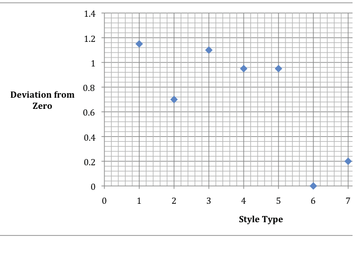HPS: History, Philosophy, and Sociology
Method:
An HPS experiment was conducted to determine student?s coping responses after being hypothetically diagnosed with an inflammatory bowel disease. An interview of two Crohn?s Disease patients was given regarding their coping methods. The questions pertained to different categories of the JALOWIEC Coping Scale (Strickland et al 2003). This scale was also used to create a student survey; 140 students in Lyman Briggs calculus classes took the survey. Responses were viewed as differences from a normal of zero. The differences were averaged; a T-Test was performed to determine significance difference from zero at an alpha level of 0.05
Results:

Absolute deviations from zero of coping styles calculated from surveys administered to 100 randomly selected MSU students. Surveys told students that they suddenly had symptoms resembling those of Crohn’s disease and that it was a genetic disease. Coping styles were based on the Jalowiec coping scale and included face up to the problem, avoid the problem, positive thinking, pessimistic thinking, release emotions, make yourself feel better, find others to rely on, and depend on yourself, respectively numbered 1-8. The responses not at all, hardly at all, neutral, somewhat and very much were assigned values of -2, -1, 0, 1, 2 respectively. These numbers were then used to count the survey results giving a value describing the deviation from zero to each number. The absolute deviations from zero of coping styles were found by finding the absolute values of the average of the answers to the survey. Statistical analysis resulted in a T-score of 4.06 and a P-value of 0.0048, rejecting the null hypothesis that there is no significant difference between how people would cope with the genetic disease “given” to them on the survey. As can be seen by the graph, coping styles 1-5, Face up to the problem, avoid the problem, positive thinking, pessimistic thinking, and release emotions had a significantly higher deviation from the null than did coping styles 6, 7, and 8, make yourself feel better, find others to rely on, and depend on yourself.